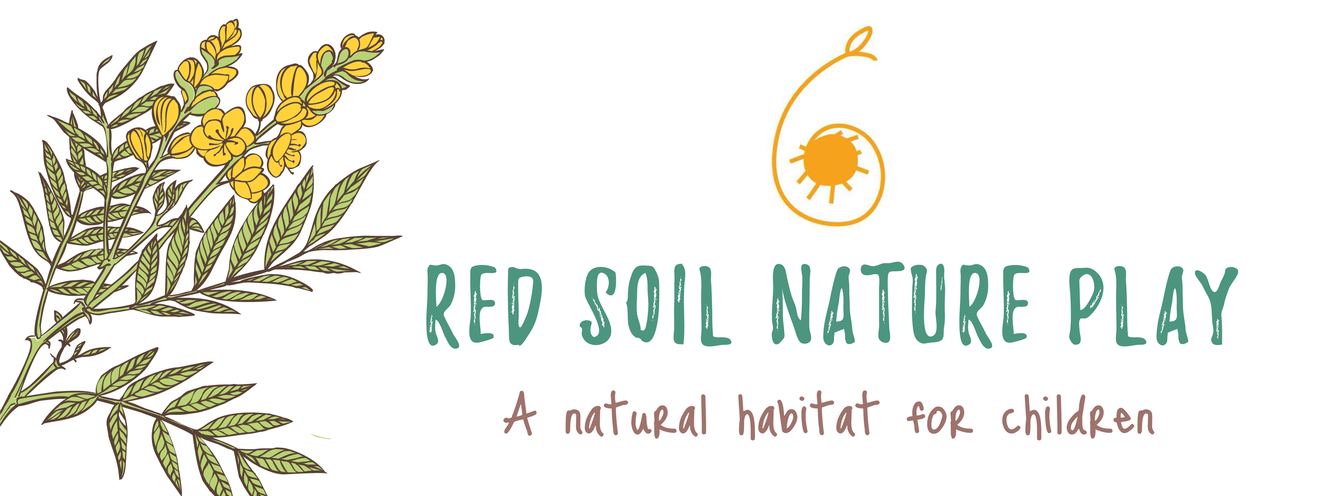Childhood play that happens in an outdoor environment where play is unstructured, open ended and lead by the child is called nature play.
Some of the activities that children engage during nature play are ‘Climb a tree’,’Roll down a grassy hill’,’Dig in the sand’,”Climb on boulders’,’Splash in puddles’,’Follow ant trails’,’Feed the birds’,’Read books under a tree’ or just ‘Day dream’. There are infinite opportunities for nature play depending on what the child wants to do.
Nature play has a huge positive impact on children’s social, emotional, intellectual, and physical well-being.
A nature play area is a carefully designed space where children have the opportunities to play with diverse natural elements, materials and habitats. Such a natural environment supports a diverse range of children’s play experiences. It develops in children a sense of self, allows them to exercise their independence and makes them aware of the interdependence they have with their ecological world.
“Every child should have mud pies, grasshoppers, water bugs, tadpoles, frogs, mud turtles, elderberries, wild strawberries, acorns, chestnuts, trees to climb, brooks to wade, water lilies, woodchucks, bats, bees, butterflies, various animals to pet, hay fields, pine-cones, rocks to roll, sand, snakes, huckleberries and hornets. And any child who has been deprived of these has been deprived of the best part of education.” - Luther Burbank
Importance of ‘Nature Play’ in Today’s Society
- The lifestyle of today’s children is engulfed in electronic media, shopping malls, mobile phones, video games and the whole commercial world around them. Such a life breeds - passivity, obesity, frustration, aggression and depression in later stages of life. It has huge adverse effects on the brain cells and healthy brain development
- Today we have deprived children of - a natural environment, a slow pace of life, the joy of unstructured free play and peace of mind
- Deprivation of the natural habitat is something to be seriously taken care of as it produces people with zero knowledge and awareness of the earth they live in
- A childhood spent outdoors in places such as parks, lakes, forests or mountains would have a profound impact on one's nature.
- Nature develops in us our innate capabilities, making us explorers and discoverers. It engages our mind, kindles our creativity and provides a serene landscape within us.
- Nature ensures that we are physically active, making us jump, cruise, skip and hop. Nature builds in us resilience, allows us to takes risks, teaches us responsibility, makes us aware of the environment and the uniqueness of living beings, instills in us a sense of fairness, and of peaceful coexistence.
- Natural habitats are in great need for the Earth and for the children of today and tomorrow.
“If we give children enough space and possibilities for free movement, they will move as beautifully and gracefully as animals; nimbly, simply, confidently and naturally.” – Dr Emmi Pikler
Scientific Research Findings on the Benefits of Nature Play
Children who play regularly in natural environments show more advanced motor fitness, including coordination, balance and agility, and they are sick less often (Grahn, et al. 1997, Fjortoft & Sageie 2001)
When children play in natural environments, their play is more diverse with imaginative and creative play that fosters language and collaborative skills (Moore & Wong 1997, Taylor, et al. 1998, Fjortoft 2000)
Exposure to natural environments improves children’s cognitive development by improving their awareness, reasoning and observational skills (Pyle 2002)
Nature buffers the impact of life’s stresses on children and helps them deal with adversity. The greater the amount of nature exposure, the greater the benefits (Wells & Evans 2003)
Nature helps children develop powers of observation and creativity and instills a sense of peace and being at one with the world (Crain 2001)
Early experiences with the natural world have been positively linked with the development of imagination and the sense of wonder (Cobb 1977, Louv 1991).
Wonder is an important motivator for lifelong learning (Wilson 1997)
Children who play in nature have more positive feelings about each other (Moore 1996)
Outdoor environments are important to children’s development of independence and autonomy (Bartlett 1996)
The need for NATURE PLAY spaces in Bengaluru
- Bengaluru is the second fastest-growing major metropolis in India and popularly known as the “Silicon Valley of India”. As a growing metropolitan city in a developing country, Bengaluru confronts substantial pollution and other logistical and socio-economic problems. This rapid growth has made Bengaluru a home to a large number of young parents and children
- The living environments for children are inconsiderate and do not cater to serve their basic developmental needs. Play schools and Kindergartens are located in houses with constrained spaces. These house-converted-playschools do not offer natural and open outdoor environments
- Bengaluru has become a city of shopping malls, traffic jams, frothing lakes and waterlogged roads. The high real estate prices have shrunk the open playgrounds and green spaces in the city resulting in deprived living environments for its future generation
- The importance of early childhood development and the vital role of natural surroundings are not being recognized in the current educational ‘market’ and hence a space like Red Soil Nature Play will become a foundation stone in the future of early childhood development in Bengaluru, India
